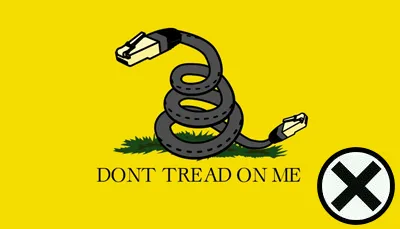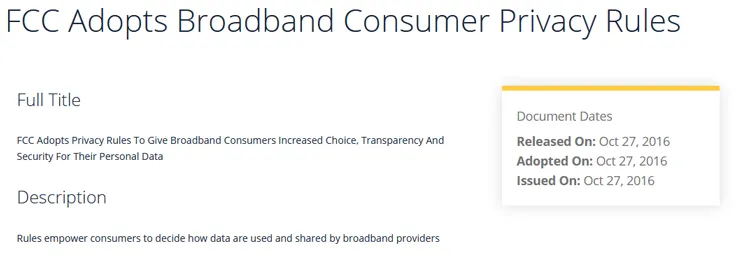
Net Neutrality has been in the news a lot recently, and how repealing it would potentially kill, or at least throttle, the internet. The majority of the conversations across the internet against the repeal have been about the speed with which people would be able to access the internet, and whether or not ISPs would have the ability to sensor certain websites if they choose.
Very little has actually been spoken about what happens to mine and your internet data though. Because ISPs are in a very privileged position within the internet ecosystem I think data privacy and security should be talked about more. As a letter from a privacy advocate group sent to Tom Wheeler, FCC Chairman, in January 2016 states "Their [ISPs] position as Internet gatekeepers gives them a comprehensive view of consumer behavior".
Your ISP tracks, stores, and mines every bit of data that passes through their network. Just imagine the amount of data that your ISP must collect on you, it's the amount of data the likes of Facebook and Google could only dream about. What the ISP's do with all that data though will be widely down to the repeal.
On 11/21/2017 the FCC finally set a date to vote on whether to repeal Net Neutrality, or not. The final vote will be on 12/14/2017. Before we go on lets find a little more out about Net Neutrality.
History of Net Neutrality
Before Feb 2015 Internet access was categorized under U.S. law as an information service, and not a telecommunications service, and thus was not subject to common carrier regulations. As of 02/26/2015 the FCC ruled in favor of net neutrality by reclassifying broadband access as a telecommunications service applying Title II (common carrier) of the Communications Act of 1934 and section 706 of the Telecommunications act of 1996 to all ISP's. 4 months later on the 06/12/2015 the ruling took effect.
Internet Service Providers across America were unhappy with the changes made to the law so on 06/12/2015 United States Telecom Association, which included Verison, AT&T, and Comcast etc, filed a lawsuit against the FCC challenging the Net Neutrality rule arguing that "the FCC reclassifying broadband carriers as 'common carriers' is an overreach on the part of the FCC". Cable, telecom and wireless Internet providers began to sue in the hope of pushing back on regulations that they said went far beyond the FCC's authority and would have a negative impact on their businesses. In June of the following year US Court of Appeals for the D.C. Circuit upheld the FCC's net neutrality rules and maintained that broadband access is a public utility, rather than a luxury.
10 months after the FCC made the decision to change the status of ISPs on 10/26/2016 the FCC does the right thing and 'Adopts Privacy Rules To Give Broadband Consumers Increased Choice, Transparency And Security For Their Personal Data'

But in march of this year the US Senate voted to nullify the rule that protected citizens data.
US Senate Votes to let ISPs Sell Your Private Data | Best VPN - 03/24/2017
Forget the NSA. The US Senate has just landed what is arguably the most serious body-blow to the privacy of ordinary American citizens in the history of the country. It has, in effect, just voted to allow Internet Service Providers (ISPs) to sell or share customers’ detailed web browsing histories and geolocation data with advertisers and partner companies.
How ISPs can sell your Web history—and how to stop them | ArsTechnica - 3/24/2017
The legal changes all stem from the FCC's decision in February 2015 to reclassify home and mobile ISPs as common carriers. The reclassification had numerous effects: it allowed the FCC to impose net neutrality rules, but it also stripped the Federal Trade Commission of its authority over ISPs because the FTC's charter from Congress prohibits the agency from regulating common carriers.
So to summarize, the repeal is to do with whether or not to reclassify ISP's as an information service as it was pre-February 2015, or to keep it as a telecommunications service. The Ars Technica article above goes on to mention that before the February 2015 reclassification of ISPs the FTC could have punished the ISP's for violating customers privacy. So it would appear repealing Net Neutrality rules would mean ISP's would be breaking the law if they were to share personal data with 3rd party companies.
I guess the big question is if the Senate do repeal, what will they be repealing back to? Who knows what to think, after all Soros funds the main pro-Net Neutrality group.
